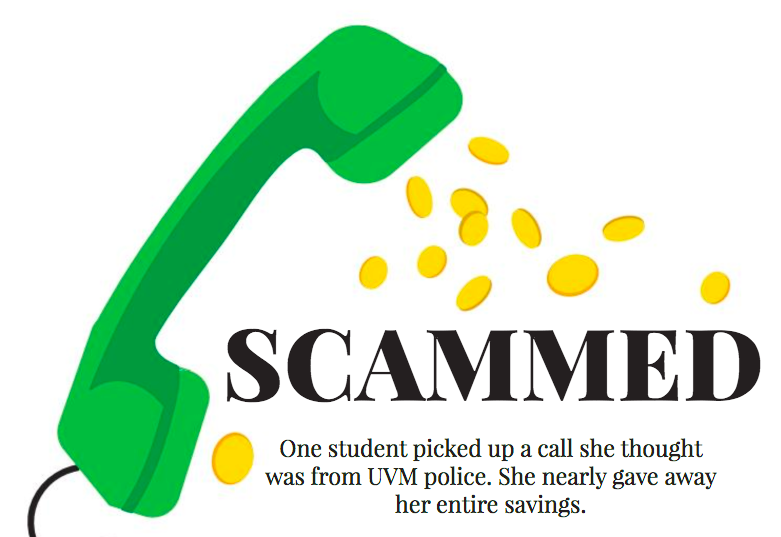Scammers target UVM students
April 21, 2018
Junior Allison Schwartz was doing homework when she received a call from an 802 area code number. She didn’t recognize the number, but answered it anyway.
“I went, ‘um who is this?’ And they were like, ‘What do you mean, ‘who is it?’ It’s the UVM Police— did you not see the number come up on your phone?”’ Schwartz said.
Schwartz listened as the man on the other end told her to drive to the closest Western Union and wire him all the money in her account. When that wasn’t an option, he told her to set up a PayPal account and contact her parents to ask for money.
UVM police had received “multiple reports that people have been targeted by a telephone scam in which the scammers are spoofing the phone number from the University of Vermont police,” according to a March 21 CAT Alert that Schwartz read before wiring the caller money.
Caller ID “spoofing” is the altering of a Caller ID so it seems like the caller is from a different number, according to the Federal Communication Commission’s website.
In Schwartz’s case, an unknown man spoofed his Caller ID so it appeared as 802-656-3473.
The man on the other end of the call identified himself as Lieutenant Christopher Reed of the UVM Police. He claimed that if she did not pay a $10,000 fine, Schwartz would be tried for selling heroin, cocaine and marijuana, she said.
Schwartz messaged her mom on Facebook. The man told her what to say: that she needed to get as much money as she could if she didn’t want to go to jail.
“He kept telling me to say, ‘I have a few things I need to take care of … I will explain everything later, I just have some things I need to pay for now … Don’t worry mom, you can trust me,’” Schwartz said.
The man told Schwartz he’d call her back from his cell phone. While she waited to hear back, Schwartz opened a CAT Alert sent out by the UVM police March 21.
Schwartz knew she had been scammed, she said.
UVM police was quick to respond, said Detective Sergeant Brandon King.
“As soon as we started getting phone calls here, we decided to put something out about that to make sure people were aware that it was a scam,” he said.
To his knowledge, no one at the University gave the scammers money, King said. Because these kinds of cases often involve multiple parties and come from overseas, they can be difficult to resolve, he said.
King warned that if UVM Police ever were to contact a student, they wouldn’t call from 802-656-3473.
“Any time UVM Police calls a student, it’s not going to come through as 802-656-3473, which is our line for if you want to call us,” King said.
Junior Jared Blodgett had a similar experience to Schwartz. In summer 2017, Blodgett received a voicemail from someone posing as an agent of the Federal Bureau of Investigation.
The man said that there was a warrant out Blodgett’s arrest and left a number for him to call back.
“I looked it up and it was totally fake, and I also looked up if the FBI would call someone and they never do,” Blodgett said.
Blodgett said that this experience startled him and he didn’t understand why his number was being targeted.








